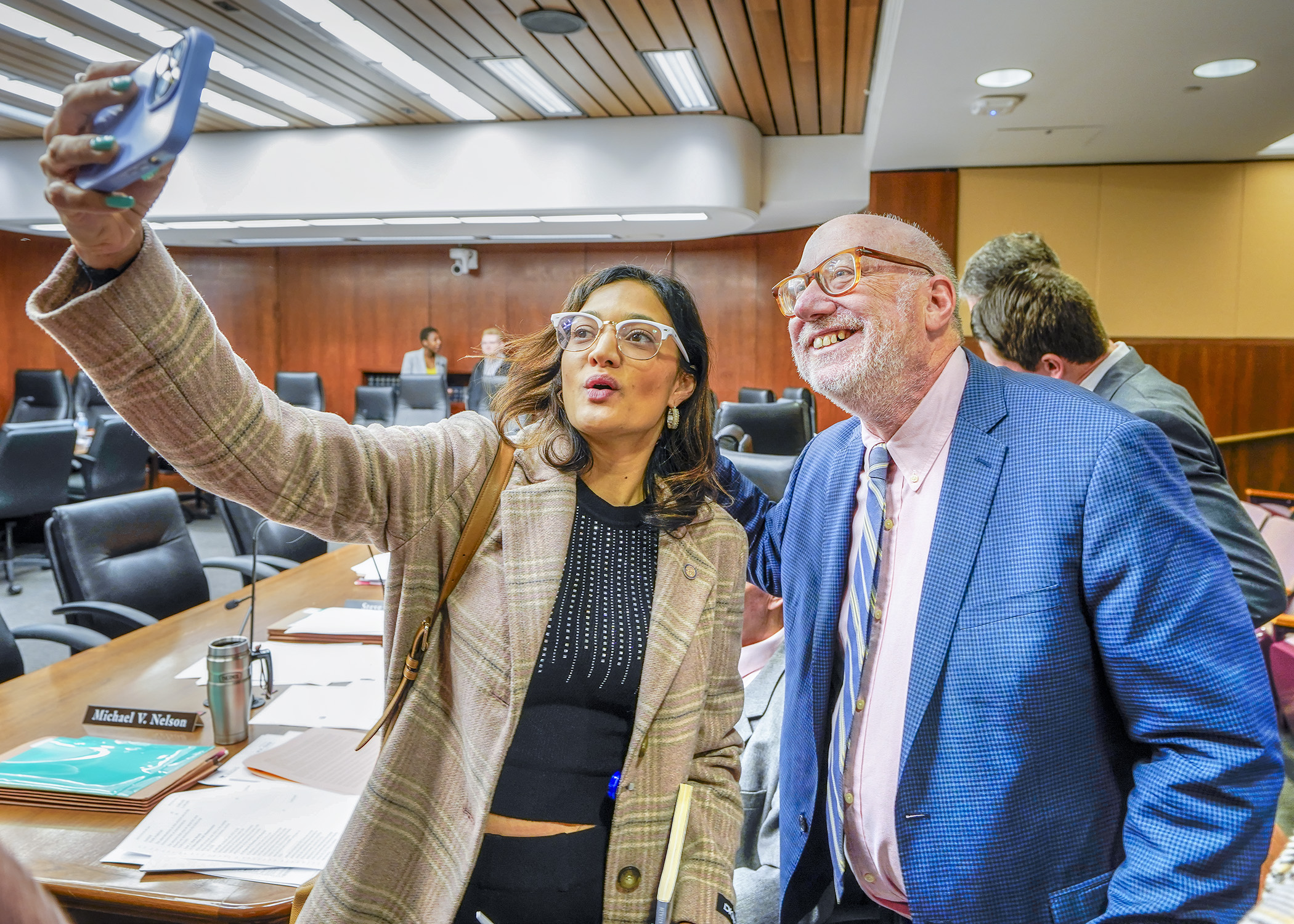Committee OK’s transportation policy, budget bill

The respect Rep. Frank Hornstein (DFL-Mpls) has garnered literally filled a room Thursday as the House Transportation Finance and Policy Committee took a short break to honor the retiring legislator in possibly his last meeting as chair.
Legislators on all sides, staff members past and present, lobbyists and members from the executive branch filed into a hearing room to thank the representative for the example he set during more than two decades in the House.
After cake, it was back to business.
Conceding he was still a bit overwhelmed, Hornstein summed up the transportation supplemental budget and policy bill, HF5242, saying it continues work on safety issues, climate, and jobs that has been part of the committee for many years.
“We’ll write the next chapters as we move forward,” he said.
Approved on a 9-6 party-line vote, the bill, as amended, is headed to the House Ways and Means Committee.
Efforts to reduce greenhouse gas emissions is a major focus of the bill, which includes much of HF4988, sponsored by Rep. Larry Kraft (DFL-St. Louis Park). These provisions would modify legislation passed last year requiring the Department of Transportation to minimize impacts of greenhouse gas emissions and vehicle miles traveled when making its plans.
A working group established from that 2023 legislation found that coordination among cities, counties and the state is critical to meet state goals in reducing emissions and mitigating their effects. The group’s recommendations include taking a portfolio approach to road work instead of evaluating projects individually. Other recommendations adopted include creating a technical advisory committee and allowing the department to implement or change allowable offset actions.
Additionally, transit officials must plan to transition to zero-emission buses.
There are also several provisions aimed at improving train safety, coming from bills sponsored by Rep. Jeff Brand (DFL-St. Peter), including one to limit train length to 8,500 feet.
Among other policy provisions, the bill would:
- ensure people convicted of impaired driving that was not related to alcohol would have drug testing instead of ignition interlocks to regain driving privileges;
- distinguish e-bikes from mopeds or small motorcycles;
- require new drivers be taught about vulnerable road users;
- extend the time a temporary vehicle permit is valid from 21 to 60 days;
- allow some colocation of high voltage power lines;
- rededicate the Gopher Gunners Memorial Bridge (Mendota Bridge) and include larger signs;
- establish a Rotary International special license plate;
- establish the Mayor Dave Smiglewski Memorial Bridge over the Minnesota River in Granite Falls; and
- allow special Minnesota United Football Club license plates with proceeds going to Minnesota Loon Restoration Project.
Spending
Among the spending provisions with General Fund implications is $9 million for small cities and $1 million to help St. Paul pay for insurance at the Union Depot. About $8 million of the funds would come from repurposing federal match dollars appropriated last year, leaving the net General Fund appropriation at $2 million, which was the committee’s 2024 budget target.
[MORE: View the spreadsheet]
Nearly $3 million would be appropriated from the Driver and Vehicle Services Account to hire 32 new driver exam testers. Most would spend their entire shift conducting tests for Class D licenses. This amount is higher than the request included in Gov. Tim Walz’s budget proposal and would allow hiring 10 more testers who could help with commercial licenses.
The Department of Vehicle Services operating account would also be tapped by $1.2 million for grants in the Lights Out program. Instead of handing out tickets, law enforcement officers would give vouchers to replace broken equipment.
The committee approved an amendment calling for $3.75 million from the active transportation account for a pedestrian bridge over U.S. Highways 10 and 169 in Ramsey and $1 million to study what Rep. Erin Koegel (DFL-Spring Lake Park) calls the “10 tangle” on U.S. Highway 65 in Blaine.
The bill calls for $77.8 million from the Trunk Highway Fund with more than half going toward fixing high priority bridges. It would also appropriate:
- $20.1 million for capital improvements to MnDOT properties;
- $7.8 million to make safety improvements to truck rest stops near St. Cloud;
- $4.8 million for improvement to culverts and other drainage areas;
- $3 million for greenhouse gas emission analysis to help with modeling;
- $1 million to help plant trees along the highways;
- $800,000 to metropolitan planning organizations for greenhouse gas assessment work; and
- $300,000 to ensure rumble strips are included on state highway reconstruction projects.
***
What’s in the bill?
The following are select bills that have been incorporated in whole or in part into the transportation supplemental finance bill:
- HF120 (Edelson)
- HF3499 (Brand)
- HF3858 (Rehm)
- HF3900 (Kraft)
- HF3904 (Swedzinski)
- HF4127 (Burkel)
- HF4268 (Sencer-Mura)
- HF4295 (Koegel)
- HF4356 (Brand)
- HF4357 (Brand)
- HF4372 (Nelson, M.)
- HF4374 (Tabke)
- HF4691 (Koegel)
- HF4988 (Kraft)
- HF5057 (Tabke)
- HF5182 (Lee, F.)
Related Articles
Search Session Daily
Advanced Search OptionsPriority Dailies
Speaker Emerita Melissa Hortman, husband killed in attack
By HPIS Staff House Speaker Emerita Melissa Hortman (DFL-Brooklyn Park) and her husband, Mark, were fatally shot in their home early Saturday morning.
Gov. Tim Walz announced the news dur...
House Speaker Emerita Melissa Hortman (DFL-Brooklyn Park) and her husband, Mark, were fatally shot in their home early Saturday morning.
Gov. Tim Walz announced the news dur...
Lawmakers deliver budget bills to governor's desk in one-day special session
By Mike Cook About that talk of needing all 21 hours left in a legislative day to complete a special session?
House members were more than up to the challenge Monday. Beginning at 10 a.m...
About that talk of needing all 21 hours left in a legislative day to complete a special session?
House members were more than up to the challenge Monday. Beginning at 10 a.m...